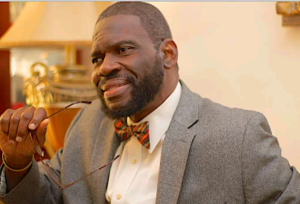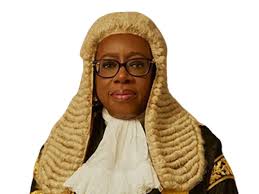
By Prof. John Egbeazien Oshodi
When the Chief Justice of Nigeria, Justice Kudirat Kekere-Ekun, recently decried the moral decay in the legal profession and called for a recommitment to ethics, many Nigerians heard not inspiration, but exasperation. Yes, exasperation—because these are not new words. We’ve heard them before. From the CJN’s predecessors. From law school podiums. From legal conferences. From the Body of Benchers.
Yet, what we have not seen is change. Or introspection. Or accountability from the judiciary’s highest temple—the Supreme Court itself.

If ethics must be revived, if justice must truly mean something to the average Nigerian, then the Supreme Court must not only talk ethics—it must embody them. And that starts with calling out questionable behaviour within its own ranks, not just at the lower levels of the profession.
Justice Emmanuel Agim and the Wike Affair: A Judicial Misstep Wrapped in Honor
The recent public appearance of Supreme Court Justice Emmanuel Agim alongside Federal Capital Territory Minister Nyesom Wike at the University of Calabar’s convocation ceremony is not just unfortunate—it is psychologically damaging to public trust. This is no minor matter.
This is a Justice who sat on a panel that handed a controversial victory to Wike’s loyalists in Rivers State by reinstating 27 defected lawmakers. A ruling that set off a constitutional firestorm. A decision that reconfigured the political power structure of an entire state. And then—mere days later—this same Justice appears in public, receiving honors, at the same venue and on the same stage as the most politically charged figure in that crisis.
The Supreme Court’s response? “Coincidence.”
The public’s response? “Compromised.”
The psychological response? “Disillusionment.”
This isn’t about whether Justice Agim flew with Wike or sat beside him. This is about perception—and perception in law is everything. It’s about the psychological contract between the judiciary and the people, a contract built on the belief that judges are above the fray, untouched by political tides, and beyond suspicion.
That contract was shaken the moment Justice Agim and Wike shared that ceremonial space
Supreme Court’s Clarification: Defensive, Not Reflective
Rather than express institutional concern over the optics of the situation, the Supreme Court chose the path of rigid justification. It issued a mechanical clarification stating that Justice Agim attended as an individual honoree and not in any political capacity.
But what the Court failed to do was acknowledge the deeper damage done to public perception. Nigerians are not analyzing legal protocol—they are assessing moral credibility.
In a democracy where justice is perceived as selective, and where the judiciary already stands accused of political alignment, a mere coincidence is not enough. We need caution, restraint, and deliberate efforts to avoid both impropriety and the appearance of impropriety—precisely as required by the Code of Conduct for Judicial Officers of the Federal Republic of Nigeria.
Rivers State Crisis: The Judicial and Executive Tango
Justice Agim’s ruling in favor of Wike’s loyalists did not happen in a vacuum. It emboldened political factions, weakened a sitting governor’s hand, and arguably became part of the foundation for President Tinubu’s controversial decision to declare a state of emergency in Rivers State.
We must ask: how did the judiciary become a pawn in a political chess game?
And more importantly: how can the CJN stand before the legal community to preach ethics while this breach of appearance goes unacknowledged?
When the executive and judiciary begin to mirror each other in behavior and language, the doctrine of separation of powers is no longer alive—it’s embalmed.
Ethics Must Begin at the Peak, Not the Periphery
Justice Kekere-Ekun’s call for a recommitment to ethics is commendable—but it is incomplete. Ethics cannot be restored by lectures, panels, and ceremonial speeches. It must begin with visible accountability.
Let us be clear: Justice Agim should have declined the award, or at the very least, ensured his attendance was brief, nonpolitical, and distant from Wike’s entourage. That he failed to consider this reflects a troubling comfort among senior justices with politically sensitive optics.
We must now go further:
Constitute an independent judicial ethics review board to assess such incidents.
Revise the Code of Conduct to explicitly restrict judges from attending high-profile political ceremonies, especially after sensitive rulings.
Create a public-facing ethics compliance registry where justices disclose ceremonial appearances in advance.
If the CJN wants a culture of ethics, she must model courage and scrutiny—not comfort and ceremony.
Psychological Erosion of Judicial Trust
From a psychological standpoint, this crisis is not just about legal procedure—it is about emotional disillusionment and civic detachment. The judiciary is not merely a chamber of law; it is a symbolic refuge in the minds of the Nigerian people. For citizens battered by years of corruption, political manipulation, and failed institutions, the courts remain—at least in theory—a last line of fairness and truth.
But that fragile trust is breaking.
Every time a judge is seen at a political gathering…
Every time judicial misconduct is ignored from within…
Every time the public is told “nothing is wrong” when clearly something is…
The symbolic weight and moral authority of the Court weakens.
This is not just about perception—it is about psychological erosion. When people no longer see the judiciary as separate from politics, they stop believing in due process. They begin to see justice as a performance reserved for the powerful. This leads to apathy, disengagement, and in time, chaos. No democracy can thrive in such a mental environment.
In more developed democracies like the United States, there are well-established ethical boundaries meant to protect public confidence in the judiciary—not merely through speeches, but through enforceable standards. For example:
American Judicial and Legal Ethics Standards (Illustrative Examples)
For Judges (based on the ABA Model Code of Judicial Conduct):
Canon 1: A judge shall uphold the independence, integrity, and impartiality of the judiciary and shall avoid both impropriety and the appearance of impropriety.
Canon 2.4: A judge shall not allow personal, political, or social relationships to influence their judicial conduct.
Canon 3.13: Judges must not accept honors or awards from entities that may compromise or appear to compromise their neutrality.
For Lawyers (from the ABA Model Rules of Professional Conduct):
Rule 8.4: It is professional misconduct for lawyers to engage in behavior that undermines public trust in the justice system.
Rule 1.11: Former public officials and judges must avoid any conduct that gives the appearance of favoritism or improper influence.
These models, though not perfect, reinforce an important truth: justice must feel real, not just be declared as such. Perception and trust are psychological currencies. When they run dry, courts become feared, not respected.
The Case for Mandatory, In-Country Judicial Ethics Training
To restore the mental and moral weight of the judiciary, Nigeria must institutionalize periodic, face-to-face or online ethics training for all legal professionals—judges and lawyers alike. These trainings should not be outsourced to foreign institutions or treated as retreats for elite circles. They must be conducted within the country, openly, accessibly, and transparently.
And more importantly: no “big man” or “big madam” must be exempt. That includes the Chief Justice herself.
Ethics training must be mandatory for all, with certification required for renewal of professional standing or practice rights. Just as medical professionals must renew licenses, those who hold the fate of citizens’ rights in their hands should do the same.
No position should be too high to learn. No robe too sacred for reflection.
This is not punishment—it is prevention. Not humiliation—but humility.
The Nigerian judiciary cannot afford another generation of legal professionals who speak of ethics without living them. It cannot afford Justices whose presence at political events undermines their rulings. And it cannot afford leaders who call for reform while exempting themselves from the discipline required to achieve it.
Until there is shared, structured, and sustained ethical development at every level, the Nigerian court will continue to drift—from a temple of justice to a theater of performance.
And once that drift becomes permanent, the people will stop looking to the courts—and begin looking away.
Conclusion:
CJN, the Mirror Is Closer Than It Appears
Justice Kekere-Ekun, talk is indeed cheap—especially when it comes without self-reflection or accountability. The ethical decay in Nigeria’s legal profession cannot be separated from the culture of silence, selective outrage, and internal complicity that now defines the judiciary’s top echelon.
Let it be said plainly: when Supreme Court Justices fail to uphold the appearance and substance of neutrality, the entire justice system loses its soul. And when the leadership of that Court looks away, yet speaks of ethics, it deepens the hypocrisy and widens the gulf between the law and the people.
Nigerians are watching. And they are tired of being treated as nothing—as if they cannot see, think, or feel. The people are not blind to these carefully choreographed public appearances, to the politically convenient rulings, or to the silence that follows obvious misconduct.
You cannot lecture a nation on integrity when your own institution shields its own from scrutiny. You cannot demand ethical renewal from lawyers when you refuse to demand the same from Supreme Court Justices. You cannot continue to insult the intelligence of Nigerians while asking them to believe in justice.
Start at the top. Start with the bench you lead. Start with Justice Agim.
Until then, your calls for ethics will continue to sound like what they are: ceremonial echoes in a hollow hall of power.
Only when you show the courage to hold your own peers accountable will your words rise above the noise—and become the first step toward real, institutional change. Nigerians deserve nothing less.
* Professor John Egbeazien Oshodi is an American psychologist, educator, and author specializing in forensic, legal, and clinical psychology, cross-cultural psychology, police and prison sciences, and community justice.
Disclaimer: “The views expressed on this site are those of the contributors or columnists, and do not necessarily reflect banneronlinrnews.com position. Banneronlinenees.com will not be responsible or liable for any inaccurate or incorrect statements in the contributions or columns here.”
© Copyright: thenigerianvoice.com




GIPHY App Key not set. Please check settings